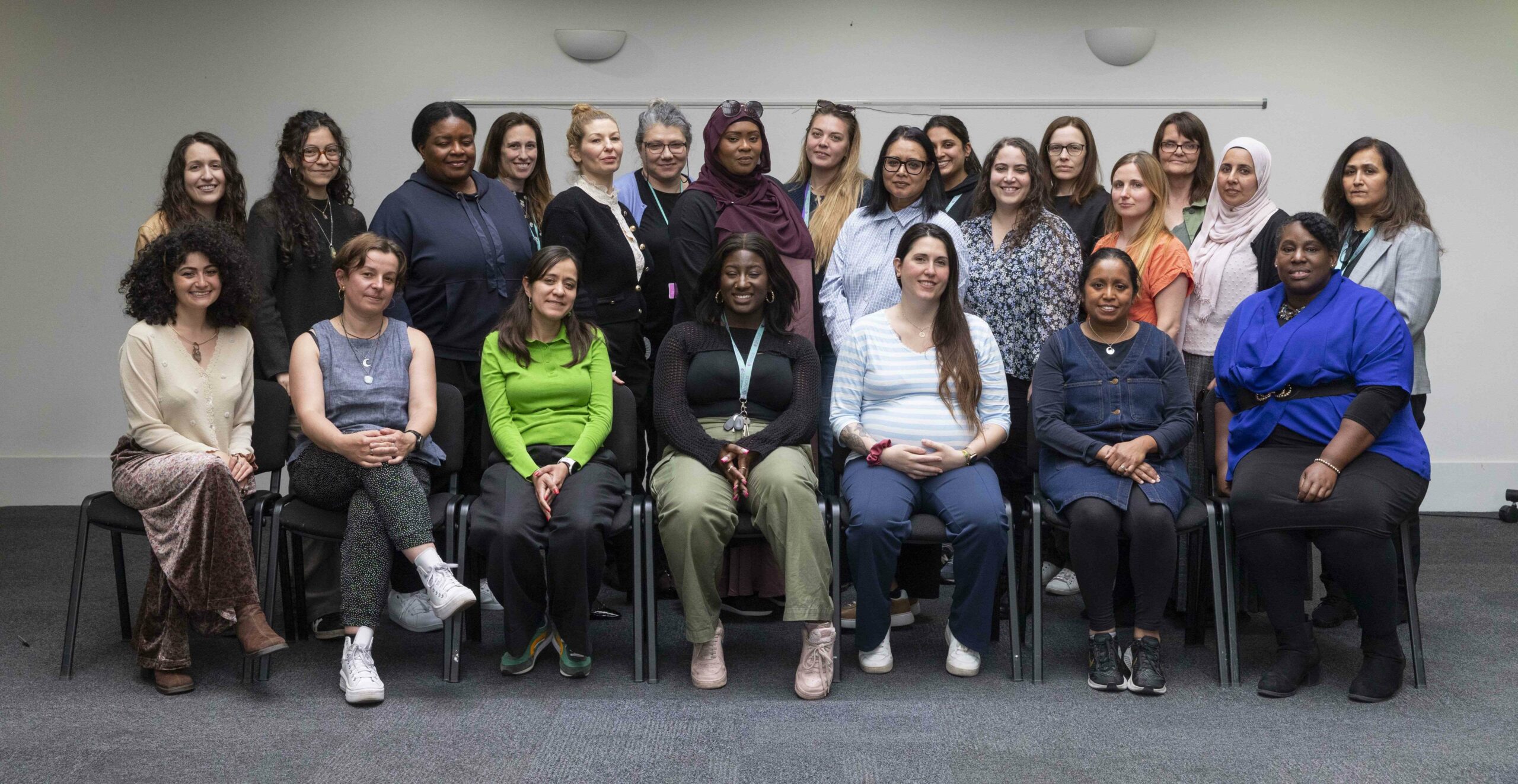Blog: Hibiscus’ Journey Addressing Barriers for Black and Minoritised Migrant Women in the UK
In this blog, Baljit Banga, Chief Executive at Hibiscus, takes a look at their partnership with The Bell Foundation, exploring what has been achieved and learned over the past ten years.
For almost four decades at Hibiscus, we have been working to address injustices towards Black and minoritised migrant women interacting with the criminal justice and immigration systems, where the majority had been subjected to violence including trafficking, modern slavery, sexual violence, and other forms of abuse. Our partnership with The Bell Foundation over the past ten years, established through a series of grant-funded projects, has helped us to do this, moving away from the short-term project-based funding that specialist women’s organisations often experience. As our partnership comes to an end, it is an opportune moment to take stock and consider what we have learned, and achieved, over the past decade.

Learning from doing – embedding literacy and language in wrap-around support and intersectionality
In 2013, the Roma Women’s Literacy project was launched to provide literacy classes to Roma women who had been criminalised by the system. Subsequently, in 2014, a Cambridge University study showed that literacy support positively impacted people leaving incarceration by providing them with essential skills to enhance their “re-integration”. It was then in 2015 that Hibiscus began to support migrant Roma women experiencing criminalisation and incarceration through a literacy programme.
Around this time, the Government introduced the Rules and Regulations for English Speakers of Other Languages (ESOL) as a possible pathway towards the regularisation of migration status under its integration and social cohesion policies. Of course, the system did not work quite as smoothly; for example, literacy, or language support was only one factor towards regularisation of status and more frequently than not, having literacy or language skills did not guarantee a safe pathway for asylum in the UK.
An important part of this “literacy and language to inclusion pathway” was the work of specialist women’s organisations like Hibiscus who provided holistic, women-centred, wrap-around support. This aspect of the work could not be replicated under a stand-alone ESOL programme or simply by promoting literacy as it required intensive intervention promoting the rights and resources of women who interacted with the criminal justice and immigration systems. Of course, literacy and language skills are beneficial; however, Hibiscus’ work found that embedding this type of support within a context addressing wider structural barriers for Black and minoritised migrant women, including the impact of institutional racism, led to better outcomes.
The first literacy project was transformative in the lives of Roma women helping them to access GP surgeries, access other ESOL training packages, improve their confidence, support them to breakdown isolation and facilitate inclusion.
The first literacy project was transformative in the lives of Roma women helping them to access GP surgeries, access other ESOL training packages, improve their confidence, support them to breakdown isolation and facilitate inclusion. It is worth noting that the emphasis through wrap-around support was on safe, trauma-informed access and preventing risk of secondary and repeat victimisation. The wrap-around, woman-centred and feminist-inspired nature of the support that was provided by Hibiscus helped women navigate through complex systems that were not designed to reflect their needs and that often re-victimised them. It is important to note that the over-arching context for support was critical to achieving outcomes.
In 2018, influenced by the work done in Albania around cultural mediation as well as the success of the literacy and language support programme in the context of wrap-around support, Hibiscus piloted a project focusing on the needs of Albanian women who had survived modern slavery or had been trafficked to the country. We wanted to learn both the benefits and limitations of a cultural mediation programme in the UK context. We were specifically interested to know how structural and institutional barriers could be addressed and tackled and we also wished to define the work of specialist women’s organisations like Hibiscus. This perspective was often lost in conceiving programmes from a wholly institutional lens. This was followed-up with a three-year project focusing on secondary research to learn from examples of cultural mediation in northern and western European countries.

The way forward – the trauma-informed wrap-around approach
Cultural mediation is a programme that provides interpretation and translation services. In addition to these services, it also provides training on cultural mannerisms to aid the understanding of diverse cultures to facilitate access to information and support. The research project completed by Hibiscus focused on examples from northern and western European countries and Albania. We found the following about the programmes that were reviewed:
- There is no clear definition of cultural mediation and in most cases, cultural mediation referred to interpretation and translation. In the UK, funding to interpretation and translation services was cut under the first austerity measures.
- Cultural mediation was mostly used in the healthcare setting where interpreters were able to translate complex medical terminology into diverse languages.
- The evidence base for trauma-informed intervention using cultural mediation is not well established. This is also the case for complex intervention for specific groups interacting with institutions and the barriers they presented.
- Black and minoritised migrant women were not mentioned as cohorts for cultural mediation.
- The violence against women and girls (VAWG) context in the studies reviewed was missing as well.
The findings from research suggest that cultural mediation is mainly used as an interpretation service. Reference to cultural mediation were inconsistent across European countries and any degree of complexity was not found to be integral to the programme. The programme worked best as an interpretation service; however, it was not found to address the intersectional needs of Black and minoritised migrant women.
Considering the learning over ten years, Hibiscus found that the wrap-around approach to support the needs of Black and minoritised migrant women located in specialist women’s organisations including Hibiscus, is essential. This approach has the following elements that are grounded in the specialist intersectional lens, or feminist approach to the work:
- It is trauma-informed addressing violence against women and girls at the heart of support delivery.
- As a trauma-informed approach, it is designed to prevent secondary and repeat victimisation ensuring that Black and minoritised migrant women are able to live their lives free from violence and harm, rebuild their resources and capacities and ensure recognition of their rights.
- The feminist lens and intersectionality are critical to the work as these ideas embed the importance of community-based support specifically designed to address trauma – for women, by women – goes a long way to ensuring women receive the support they need in a non-judgemental space where they are believed, and which is reflected in organisations that look like them.
We accept the need for interpretation and translation support and suggest that such support is embedded in women’s specialist provision and that such services are appropriately funded to support women.
We suggest this support is already known as wrap-around, women-centred, and trauma-informed that cannot be transferred to institutions that do not look like the women who access services.
We call on Government to support women’s specialist services through sustainable long-term funding following the successful model that has been tried and tested by The Bell Foundation in their support to the work of Hibiscus.
The support from The Bell Foundation and its approach to sustainable funding
Reflecting on our partnership over the past decade, it is clear that the relationship between Hibiscus and The Bell Foundation was unique for the following reasons:
- It recognised the specialist nature of support provided by Hibiscus to Black and minoritised migrant women navigating complex criminal justice and immigration systems and addressing violence against women and girls.
- The funding over a ten-year period contributed to sustainability for Hibiscus as we were able to secure employment contracts and do a deep-dive, with continuous funding, into the work we were doing to address barriers for the women we supported.
- The ongoing funding also expanded the work into research to enable a better understanding of the programmes that were designed to promote women’s access and other opportunities in the UK context.
The learning over ten years enabled Hibiscus to consider the social and racial justice context of the work that was funded and develop a specific recommendation on rights-based provision from an intersectional lens.
About this partner

Hibiscus enables Black and minoritised migrant women interacting with the immigration and criminal justice systems to rebuild their lives.
